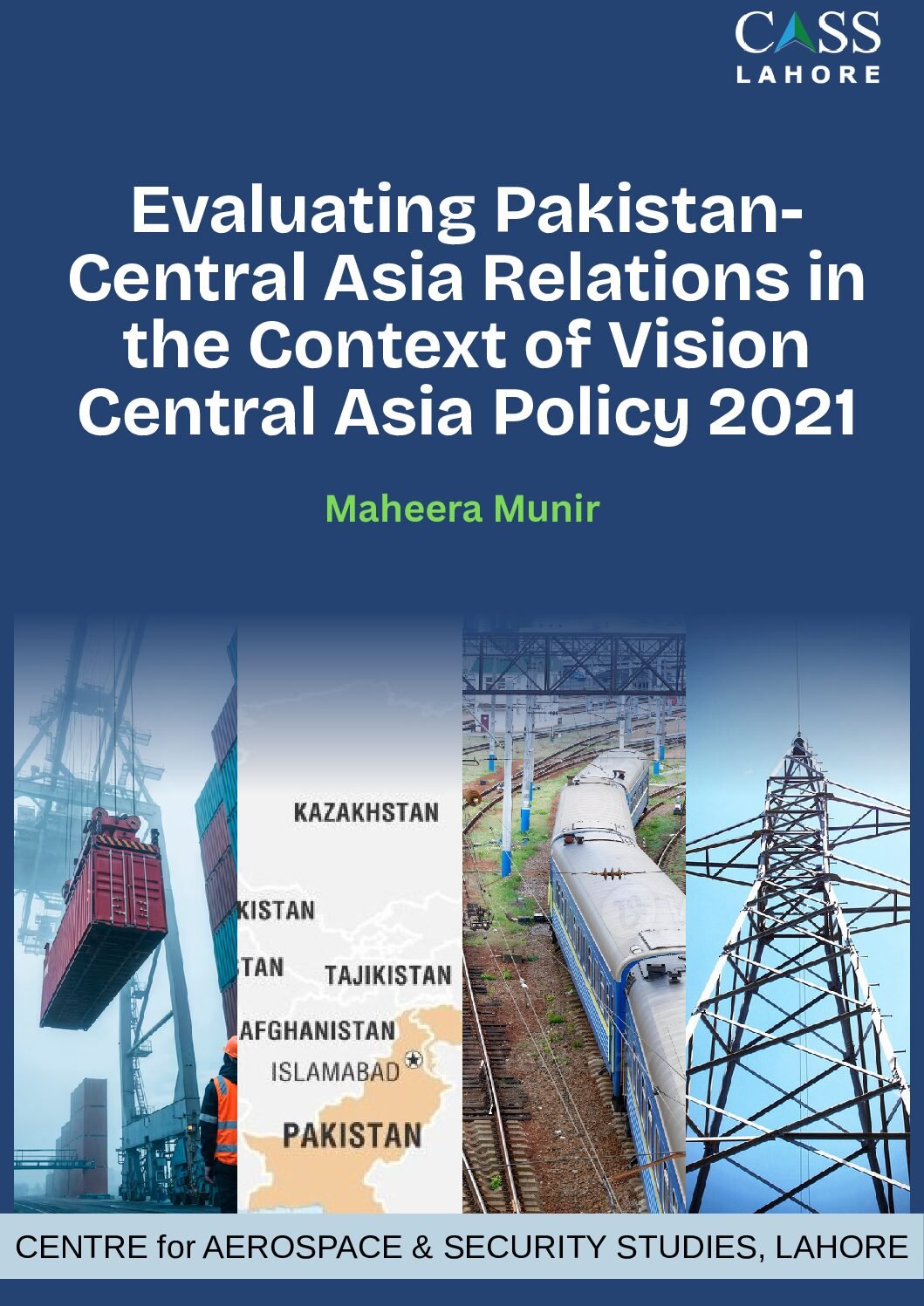
Situational Paper
EVALUATING PAKISTAN-CENTRAL ASIA RELATIONS IN THE CONTEXT OF VISION CENTRAL ASIA POLICY 2021
APRIL 2025
ABSTRACT
This paper critically evaluates Pakistan-Central Asia relations within the framework of Pakistan’s Vision Central Asia policy, launched in 2021. The policy aims to strengthen political, economic, and socio-cultural ties between Pakistan and the five Central Asian Republics (CARs): Kazakhstan, Kyrgyzstan, Uzbekistan, Tajikistan, and Turkmenistan. Focused on sectors such as trade, energy, and transportation and infrastructure development, the paper explores both the achievements and challenges of implementing the policy. It assesses the progress in enhancing regional connectivity, focusing on key initiatives like the CASA-1000, TAPI, and the QTTA, and the potential for linking Central Asia with the China-Pakistan Economic Corridor (CPEC). Furthermore, the paper highlights the influence of regional power politics, including the roles of China, Russia, Iran, India, and the ongoing situation in Afghanistan, as significant barriers to deeper Pakistan-Central Asia integration. Ultimately, this study contributes to a better understanding of the opportunities and constraints in Pakistan’s efforts to enhance its role as a regional hub for trade and connectivity in Central Asia.
Keywords: Pakistan, Central Asian Republics, Vision Central Asia, CASA-1000, TAPI, QTTA
POLICY RECOMMENDATIONS
While Vision Central Asia policy offers a strategic foundation, relations with Afghanistan are the building blocks for its materialisation. Pakistan needs to launch a dedicated diplomatic initiative to engage the Taliban government in order to resolve the increasing issues of cross-border terrorism. Confidence Building Measures (CBMs) such as joint counter terrorism operations, joint border management, and revenue-sharing from energy projects such as CASA-1000, TAP-500 must be designed and established for regional stability and security.
- Modernise the Pak-Afghan Transit Trade Agreement (APTTA) and the Quadrilateral Traffic in Transit Agreement (QTTA)
Pakistan and Afghanistan need to accelerate negotiations on the revival of APTTA as it enhances Afghanistan’s position as a transit country in regional trade. The newly negotiated APTTA must include protocols for digital customs management to reduce obstacles in trade. APTTA can also integrate the TIR Convention for smoother cross-border trade operations and goods facilitation. Moreover, while the security situation on the Afghanistan front remains problematic, Pakistan needs to ensure that trade with CARs continues through the QTTA route. For that, it is significant to integrate the TIR Convention with QTTA. Pakistan needs to engage China and CARs to amend the QTTA and jointly adopt the TIR protocols on a priority basis.
Vision Central Asia policy calls for the expansion of trade and investment links. In order to further enhance trade with CARs, Pakistan must propose signing bilateral and multilateral preferential trade agreements for the reduction of tariffs and the removal of non-tariff barriers.
Energy projects like CASA-1000 and TAPI are a win-win for all the stakeholders so they need to come together to formulate a joint task force to ensure security and accelerate the construction of respective projects. Moreover, as Kyrgyzstan and Tajikistan are not part of the current energy agreements, Pakistan can engage them for hydropower projects and solar energy agreements to strengthen regional energy cooperation under the Vision Central Asia policy.
In order to navigate regional power politics and maximise its interests, Pakistan should expand its Vision Central Asia policy to incorporate a balanced regional approach. Pakistan must maintain strategic neutrality between great powers like the US, Russia and China and adopt diplomatic hedging for positive relations with Turkiye and Iran. As far as India is concerned, Pakistan must closely observe its actions in the Central Asian region and focus on offering Gwadar port access, which is naturally a shorter and more feasible route for CARs to access the Indian Ocean.
Author(s)

Maheera Munir
Research Assistant
CASS LAhore

The Centre for Aerospace & Security Studies (CASS) was established in July 2021 to inform policymakers and the public about issues related to aerospace and security from an independent, non-partisan and future-centric analytical lens.


